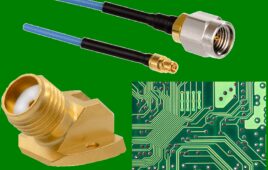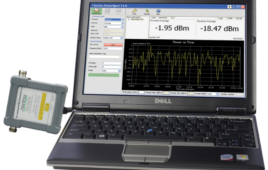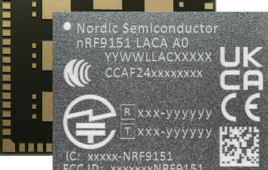 Peregrine Semiconductor Corp. announces the next chapter in intelligent integration—integrated phase and amplitude control at microwave frequencies. In the fall of 2014, Peregrine introduced intelligent integration, a unique design capability of UltraCMOS® technology that enables the integration of RF, digital and analog components onto a single die.
Peregrine Semiconductor Corp. announces the next chapter in intelligent integration—integrated phase and amplitude control at microwave frequencies. In the fall of 2014, Peregrine introduced intelligent integration, a unique design capability of UltraCMOS® technology that enables the integration of RF, digital and analog components onto a single die.
Peregrine uses this design capability to offer benefits such as configurability, flexibility, enhanced performance, reliability, repeatability, ease-of-use and a reduced form factor. By enabling phase and amplitude control at higher frequencies, Peregrine can provide clear benefits to markets and applications including wireless infrastructure, synthetic aperture radar (SAR), beamforming and interference cancellation.
Intelligent integration has enabled Peregrine to develop its family of MPAC products—monolithic phase and amplitude controllers for the LTE and LTE-A wireless infrastructure transceiver market. MPAC products provide maximum phase and amplitude tuning flexibility in dual-path dynamically load-modulated amplifier architectures, such as Doherty amplifiers. Each controller integrates a 90-degree hybrid splitter, phase shifters, digital step attenuator and a digital serial interface on a single die. Leveraging the capabilities of MPAC into other integrated products, Peregrine sees many potential applications at higher frequencies.
“As the frequency spectrum becomes more crowded, many commercial applications are moving to higher frequencies,” says Andrew Christie, technical marketing manager at Peregrine Semiconductor. “Phase and amplitude control is critical to these applications. The need for Peregrine’s intelligent integration capability has never been stronger.”
Next-Generation Systems Need Intelligent Integration
Next-generation cellular systems, such as 5G, will rely more on beamforming antennas to improve data rates and provide users with better quality of service (QoS). These antennas require advance analog and digital signal processing capabilities in order to accurately steer multiple signals simultaneously. 5G solutions will need fast, reconfigurable antennas that independently and accurately control the phase and amplitude of each antenna array. The key to achieving this desired performance is intelligent arrays that can operate at high frequencies. With increased analog accuracy, resolution and speed of reconfiguration, intelligent arrays can be further optimized for their overall performance—whether it is the fundamental beam pattern or reducing unwanted interference.
SAR and active electronically scanned array (AESA) systems also rely on phase and amplitude control to achieve accurate performance. Using intelligent arrays, these commercial and military systems demand accurate and fast array reconfiguration in order to achieve accurate target tracking, low power consumption and jamming suppression through side-lobe cancellation.
Building on the success of the MPAC product family, Peregrine is developing a family of core chips—monolithic controllers that offer phase and amplitude at microwave frequencies. Ideal for high density, compact arrays, these core chips provide a reliable solution to applications ranging from 5G beamforming to weather radar and air traffic control. UltraCMOS technology and intelligent integration allow memory elements to be added to the chip that allow pre-loading of configurations. These configurations can then be automatically cycled at high speed. Additionally, integrated digital components allow flexibility to tune gain and phase at very fine resolutions.
Learn More About Intelligent Integration
Peregrine’s technical marketing manager, Andrew Christie, will deliver a presentation on “Intelligent Integration in SAR and AESA Systems” at European Microwave Week 2015 Defence, Security and Space Forum. His afternoon session will be on Wednesday, Sept. 9, 2015 at the Palais Des Congres in Paris.




